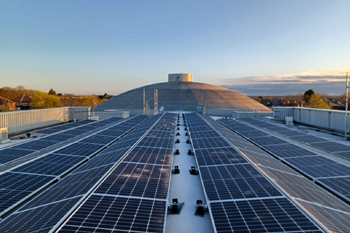
GLL's Chris Hebblewhite reveals progress on the co-op's five year sustainability strategy
GLL is the UK's foremost charitable social enterprise improving community health and wellbeing though leisure and cultural services.
Many of these are provided with councils, helping to meet their service obligations.
As authorities align resources towards Net Zero, GLL understands the urgency of reducing CO2 emissions, saving energy consumption and lowering fuel bills – in turn, keeping customer entry affordable.
Through its purpose, clients, networks and consumption, GLL is uniquely positioned to do this – and has placed ‘Respecting The Planet' at the centre of its corporate strategy.
Energy and carbon reduction goes far deeper than capital investment. A key action of our sustainability strategy has been the development of our own bespoke Management Training Programme, specifically created for the sector, as there was very limited meaningful sector-specific training material available.
Greening libraries
GLL runs public libraries in partnership with councils in Lincolnshire, Dudley, Bromley, Wandsworth and Greenwich. GLL libraries are exemplars of ‘greening' public services – we reduce, reuse and recycle what isn't needed.
Plastic library cards are being phased out for biodegradable alternatives – while new technology will allow users to manage their library loans on their phones too.
GLL supports the council's recycling aims for Bromley, offering community recycling points for paper and batteries, selling composting bags and garden waste stickers.
Refill stations provide water for reusable bottles. Investments in LEDs, low VOC paint, sustainable and upcycled furniture make for a lighter, brighter and more comfortable library.
GLL has also reduced emissions from transportation (through the direct delivery of book stock to library branches) and energy reduction (sharing hardware and running fewer hosted servers).
Working in partnership with Library of Things, visitors to some of GLL's libraries can not only borrow books, but also a sewing machine, power washer, football or a drill.
Greening leisure services
Heating GLL's 150 premises with swimming pools is our single largest contributor of CO2 emissions and one of the biggest expenses – the cost of heating a 25m pool rose by 270% in the pandemic.
In response, we have reduced energy-use by 7%, investing more than £1.5m in LED lighting, variable speed drives, pool covers and an in-house BMS Bureau to increase plant efficiency.
Decarbonisation projects are under way in Cambridge, Chelsea, Hatfield, Hillingdon and Manchester in partnership with local authorities, installing heat pumps and solar PV panels to reduce reliance on fossil-fuel energy and slash carbon emissions. 80 of our 250 premises now generate renewable energy.
In Newcastle, an ambitious city that has committed to Net Zero by 2030, a significant scheme has been completed to decarbonise heating systems at four leisure centres with both large solar arrays and air source heat pumps.
In addition, air-handling systems, poolside glazing and upgraded control systems have enhanced the efficiency of the building and improved the customer experience.
Matt Wilton, deputy chief executive at Newcastle City Council, said: ‘Reducing carbon emissions from Newcastle's public buildings makes them more energy and cost efficient. £27m has been spent at 30 sites across the city, saving 2,763 tonnes of CO2 each year or 46,830 tonnes over their lifetime.
‘We remain committed to working with partners, such as GLL, to make a real and lasting change and create a cleaner, greener city for everyone.'
GLL now have 70 solar PV arrays generating 3.5m kWh of green electricity – equating to 3.5% of GLL's total electricity demand. Solar generation equates to a reduction in carbon emissions by more than 700 tonnes of CO2 annually.
South East London Energy's (SELCE) chief executive Giovanna Speciale said: ‘SELCE owns and operates community-financed solar PV on GLL's Thamesmere and Coldharbour Leisure Centres in Greenwich, providing low-cost, clean and green electricity.
‘GLL, a fellow co-op, share our aim of serving our community while making our spaces fit for the future.'
PowerUp North London (PUNL) chair Joanna Macrae commented: ‘The success of GLL's Talacre Leisure Centre solar project illustrates what can be achieved when local organisations, committed to cutting CO2, work closely together.
Tackling climate change is something local people genuinely care about. PUNL looks forward to building on the positive partnership with both GLL and Camden LBC.'
Following reports that data centres can transfer their unwanted heat to swimming pools, we are investigating whether this is viable for pools in York under our management.
Making room for nature
Some of our facilities provide scope for boosting the local ecology.
At the brand-new Lee Valley Ice Centre (LVIC) in Waltham Forest, where we promote green travel, cyclists share space with ‘bug hotels', extensive wildflower planting and a newly-created lake with reed filter beds using waste ice from the rink – and some very happy amphibians!
The roof of LVIC boasts 500m2 of solar panels. Other sites have green roofs which slow run-off in wetter winters and support plants and invertebrates.
Chris Hebblewhite is director of sustainability, standards and compliance at GLL

